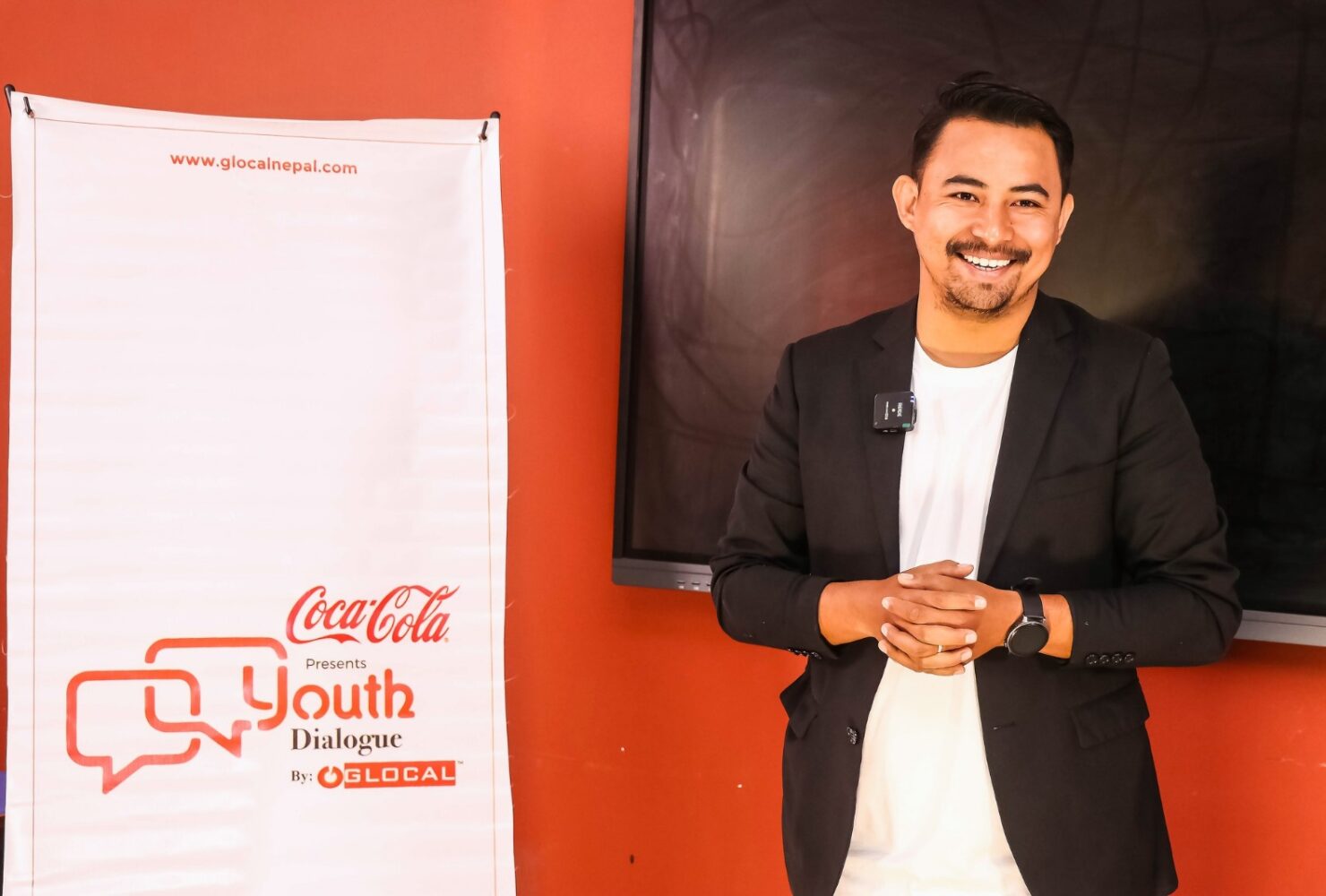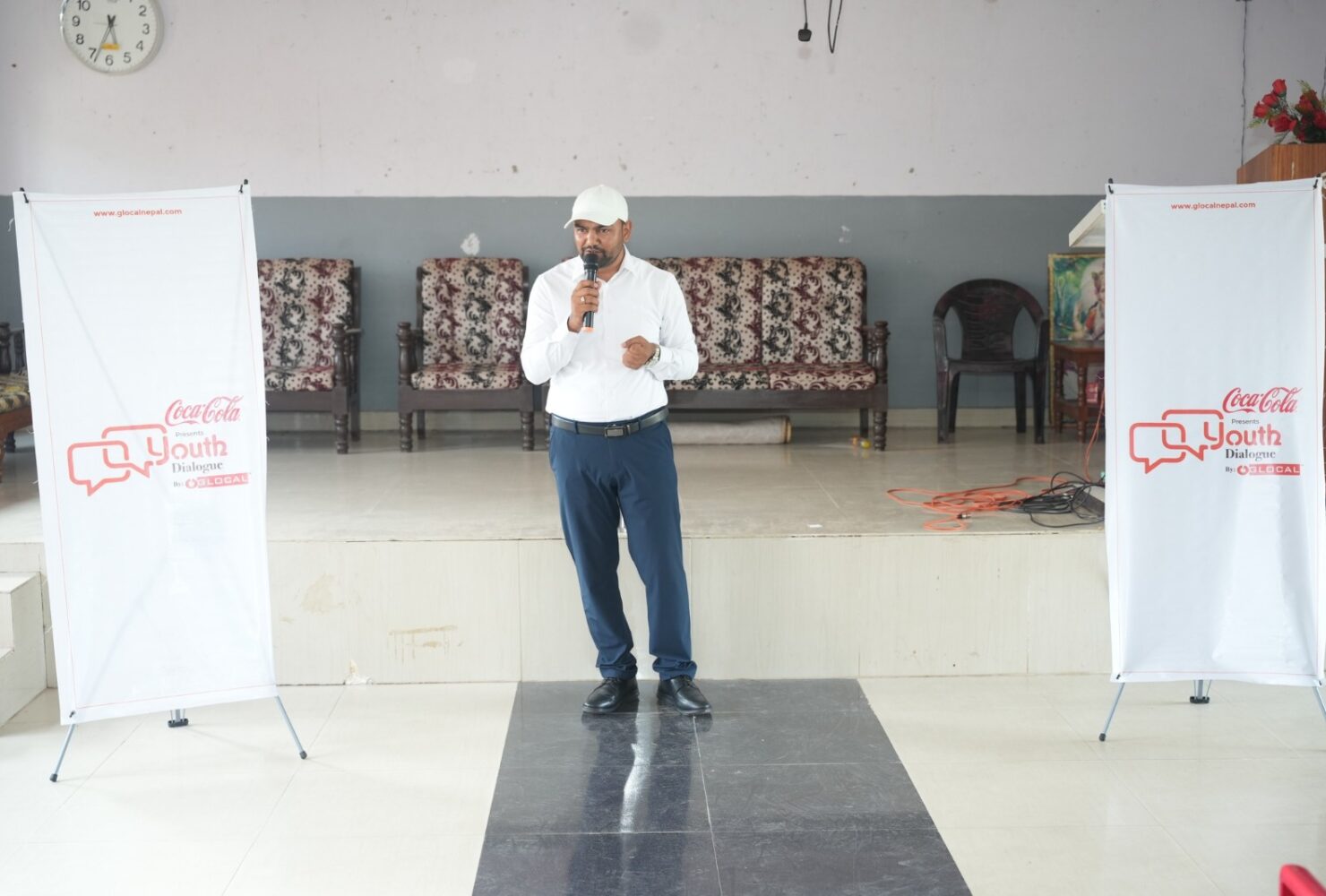Coca-Cola presents Youth Dialogue is a monthly series youth-centric discussion session organized by Glocal Pvt. Ltd. It is a platform that invites different personalities from different sectors to share their initiation, experiences, challenges and motivation.
Youth dialogue delivered exciting sessions on various themes like Sports, Environment, Entertainment, Business, Culture, Tourism to develop the skills in the changing labor market. The speakers of the program are Youth Influencers, Skillful persons, Entrepreneurs, Celebrities and Politicians. It is a 1- hour long discussion series that contains a live audience and later it will be broadcast through YouTube, Instagram and Facebook.
Youth Dialogue’s fifth session conversed on the topic of “Skill Development to Improve Youth Employment.” An insightful and extremely invigorating session ended with a successful presence of students amidst an event held at the premises of British College. The dialogue had a presence of two amazing personalities and the participating panelists were;
- Mr. Rajan Koirala, Chief Business Officer at Edusanjal
- Mr. Sulab Baral, Program Officer at United Nations Volunteers
The panel discussion was moderated by Ms. Saru Pyakurel, Corporate Officer at Glocal Pvt. Ltd.
Here is the gist of the discussion;
What triggers your mind when you think about skills?
Sulav: Before talking about skills, I would like to stress that young people should identify their interests and their passion, and once they identify that, they need to idolize someone they look up to. They need to expose themselves to knowing people in their field of interest. In the process, they should continuously seek to develop their skills and learn, relearn and even unlearn some skills.
So, for me, skills is a lifelong learning process as you get exposed to different working environments. Eventually, you grow to do what you love doing.
Rajan: Simply speaking, a skill is an education! I say that because, in my view, a certificate is a gate-pass to your career while skill is something that you must have when you are inside that gate. In the absence of skills, it is always possible for you to be kicked out of the job anytime in the future. Education and skills are equally important, but research suggests that by 2030, 70 percent of the jobs that we currently have are going to die. So, if we do not equip ourselves with some of the trending skills, our life may get into some career crash.
Likewise, Mr. Sulav discussed the importance of investing in the skill development of young people in line with 2030 agendas and global initiatives on decent jobs for youths. He mentioned that in this 21st century, having skills along with regular updating of those skills is necessary. In that course, you must also invest your time in learning new skills too. You need to learn not only the table work, but also the soft skills.
He talked about the 2030 agendas, he addressed, “I believe that collaboration between institutions like the one between Glocal and the British college and the panelists, and platforms like these can trigger that urge to learn in youths.”
How does training contribute towards skill development in youths?
Sulav: Telling from my own experience, I was hesitant to communicate with my teachers outside the class, but with regular programs and panel discussions being organized by our school, I started connecting with like-minded people and experts in their field. From there, I started taking mentorship and guidance from them to pave my way towards my career. You will come across such opportunities a lot of times, the thing is you should have that spark and zeal to learn from and connect to them. With that zeal and determination, there are numerous opportunities to get yourself trained for developing the skills you need to have for your career, be it as an employee or an entrepreneur.
Rajan: Training is definitely an effective tool to develop skills in youths, but more effective than that is workshop because we retain 70-80 percent of the things we do by ourselves while only 50 percent of something demonstrated by others is retained by the human brain. In training, you only get to hear from others, but when you actually get to practice the skills in the workshop, you retain more than 80 percent of the learning. Training and workshop is important but the attitude and the thrive to learn the skills is more important to actually develop skills in youths.
What are the three skills that helped you to be what you are today?
Sulav: First skill that has helped me be who I am today is emotional intelligence, the second is self-management and the third is communication skills.
Rajan: Communication is the skill that has helped me express myself. I believe in cognitive adaptability has helped me do my work as perfectly as possible. And networking is the skill that has helped me build ties with the people around me.
What is the main challenge that youths face while entering the labor market?
Rajan: I find a lot of youths coming to us and saying that even to apply for entry-level jobs, they are required to have work experience of 2-3 years and they are frustrated. There is a huge confusion among youths regarding this. The scenario is different and even if the students do not have real work experience, their involvement in extracurricular activities or volunteering, etc also indicates their command in some kind of work already. I would like to assure the youths that it is not only work experience that is sought by companies to hire you, it is the level of enthusiasm and zeal you demonstrate in building networks with people related to that field, searching for such opportunities to meet such people and so on. We find that most of the youths do not grab the opportunity to do so even if they have the chance. So, I feel that the biggest challenge is the youths not taking the step ahead of themselves. I suggest that they work at building a network with people of the field they want a career in, that is the biggest asset you can have.
Words of wisdom for the youths!
Sulav: For the young people, take it easy. When you feel that you are having a hard time, take a break and reflect upon yourself. You need to practise LEAD: Listen to yourself and your surroundings; Empathize people to understand others’ experiences; Analyze what your next steps would be and do Collaborative work in order to move ahead in life.
Rajan: The biggest challenge for youths and almost everyone is the confusion about what they want in life and their career. I suggest that you move through the confusion by taking support from experts or friends or mentors or anyone who can help. Apart from that, self-realization is the key. Knowing who you are and what you can do is important first and after you realize that, you can easily pave your path ahead. Along with that, build a network for yourself, make yourself a brand and keep updating about whatever you are doing.





